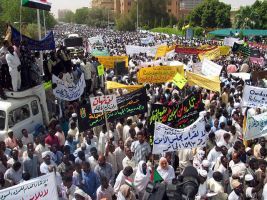Thousands of Sudanese protest against UN force
Mar 8, 2006 (KHARTOUM) — Shouting “Down, Down USA,” thousands of Sudanese paralysed the streets of Khartoum on Wednesday protesting against any deployment of U.N. troops to the violent western Darfur region.
 “Get out all foreigners, we don’t want you here,” shouted 21-year-old student Zeinab Kheir el-Sir.
“Get out all foreigners, we don’t want you here,” shouted 21-year-old student Zeinab Kheir el-Sir.
“Darfur will be the grave of the conquerors,” said banners carried by the demonstrators.
African Union foreign ministers are due to decide on Friday whether to ask the United Nations to take control of their 7,000-strong mission monitoring a shaky ceasefire in Darfur.
U.N. officials have sought NATO and EU support to bolster the AU force, which lacks funds and equipment, triggering alarm in Sudan which opposes intervention by non-African troops.
Ahead of the AU meeting, senior western officials held talks in Brussels with Sudanese leaders aiming to persuade them to agree to the deployment of a U.N. mission in Darfur.
But after a government-led media campaign against U.N. intervention, nationalist sentiment in Sudan is running high.
The pro-government al-Intibaha newspaper has announced the formation of two new Islamist movements threatening to target foreign interests, called the Darfur Jihad Organisation and the Blood Brigades.
The protesters handed a statement to U.N. offices demanding the immediate eviction of the top U.N. envoy in Sudan, Jan Pronk. Sudanese women bearing kalashnikovs joined the march, declaring their readiness to fight foreign troops.
The defence minister also rallied troops against intervention at a military demonstration in Khartoum.
“Jihad, victory, martyrdom,” the soldiers chanted. “Our martyrs are in heaven, and we are ready,” said Defence Minister Abdel Rahim Mohamed Hussein.
Hussein last week threw out all foreign press from a news conference, accusing them of fabricating the Darfur conflict, which Washington calls genocide.
Khartoum denies genocide in the arid west, but tens of thousands have been killed and 2 million herded into camps by three years of rape, looting and killing. The International Criminal Court is investigating alleged war crimes there.
Among the crowd of demonstrators, one brave woman quietly said she supported intervention in her place of origin, Darfur.
“I don’t think the government can solve the problem, nor can the African Union,” student Maha Mekki said. “I want America to come in,” she said.
CHANGE OF COMMAND?
The United Nations is currently deploying about 10,000 troops to Sudan’s south to oversee a separate peace deal signed last year to end more than two decades of civil war there.
But the government and opposition parties have all said they do not want this U.N. force to be extended to Darfur as well.
“In the south they are there to help, but in Darfur this will just be a front for Israel and America to come in to get our oil,” said demonstrator Amal Jaafar.
Sudan produces roughly 330,000 barrels per day of crude, mostly from fields in the south.
U.N. sources say any U.N. force in Sudan’s west is likely to keep the same AU forces on the ground, but change the command to a U.N. peacekeeping mission.
In Brussels, EU foreign policy chief Javier Solana met Sudanese Vice-President Ali Osman Mohamed Taha to try to convince Sudan to accept U.N. peacekeepers.
Asked if he had succeeded, Solana said: “We hope that at the end of the day we have good news to tell you.”
U.S. Deputy Secretary of State Robert Zoellick, who joined the talks, has said he would push for a U.N. mission.
“We believe that, to the maximum extent possible, the AU forces in Darfur should be incorporated into the U.N. mission in which Africans should play a key leadership role,” Zoellick said in a statement before leaving Washington.
An EU official said that stressing the continuing role of the AU could help persuade Sudan to accept U.N. involvement.
AU Commission chairman Alpha Oumar Konare told reporters in Brussels that the AU would bear in mind the importance of partnership with the United Nations, the need for African leadership and respect for Sudan.
(Reuters)
